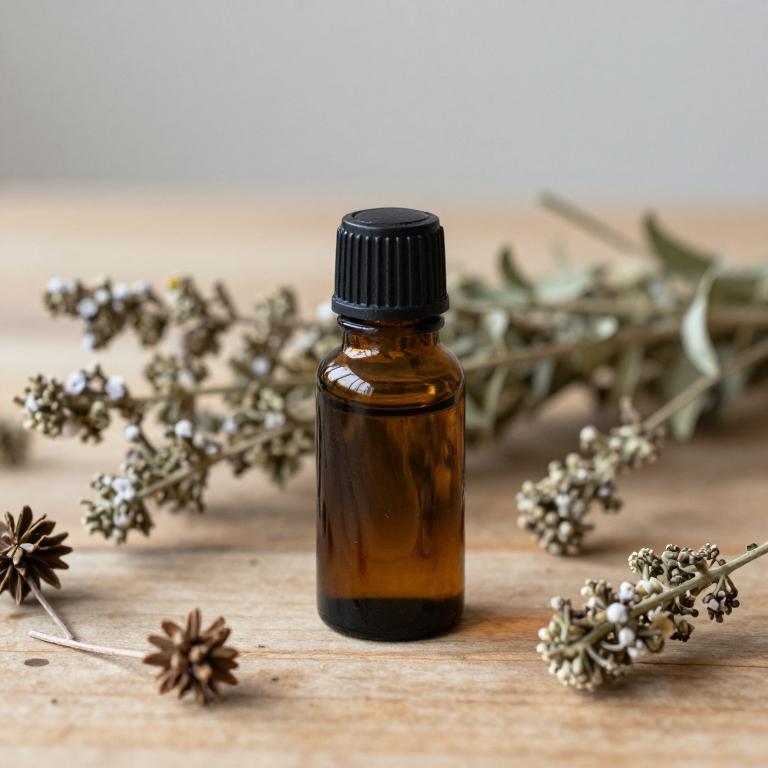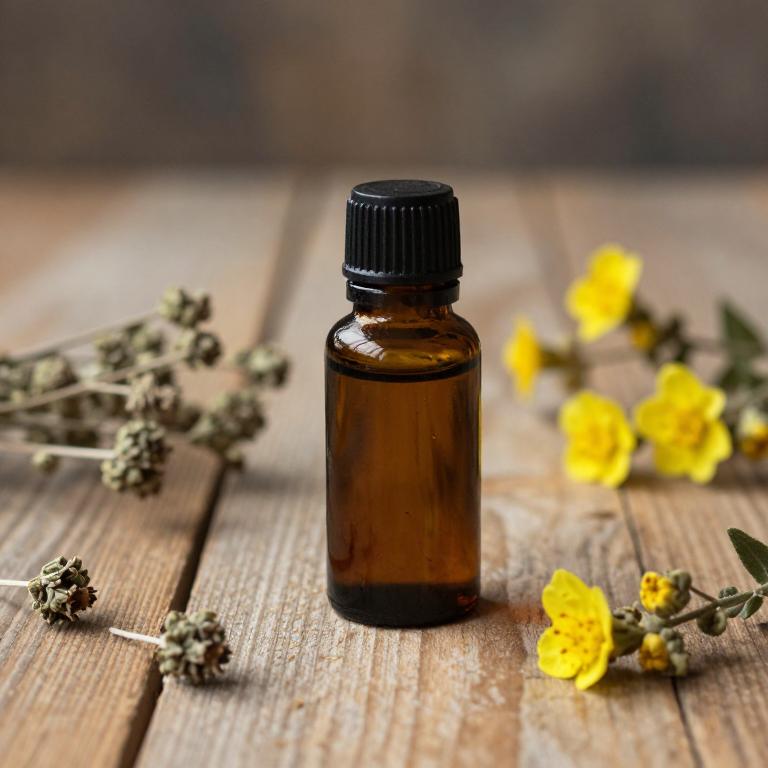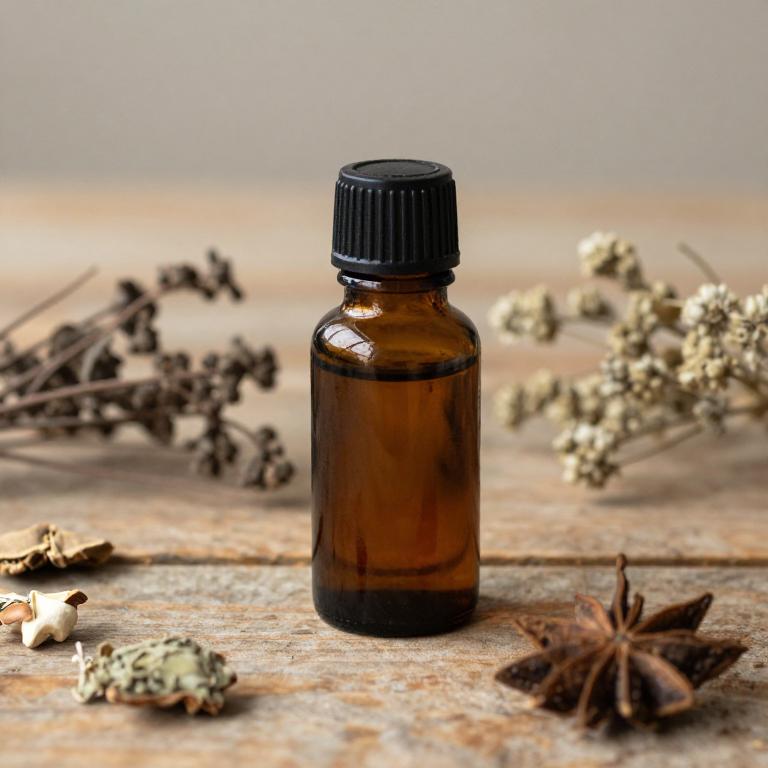10 Best Herbal Essential Oils For Boils

Herbal essential oils, such as tea tree oil, lavender oil, and eucalyptus oil, are commonly used for their antimicrobial and anti-inflammatory properties to help treat boils.
These oils can be diluted with a carrier oil and applied topically to the affected area to reduce infection and promote healing. Tea tree oil, in particular, is known for its ability to combat bacterial growth, which is often a cause of boils. However, it is important to always dilute essential oils before use to avoid skin irritation.
When used correctly, herbal essential oils can be a natural and effective complementary treatment for boils.
Table of Contents
- 1. Eucalyptus (Eucalyptus globulus)
- 2. Melaleuca (Melaleuca alternifolia)
- 3. Ceylon cinnamon (Cinnamomum zeylanicum)
- 4. Thyme (Thymus vulgaris)
- 5. English lavender (Lavandula angustifolia)
- 6. Rosemary (Rosmarinus officinalis)
- 7. Greek oregano (Satureja hortensis)
- 8. Common teucrium (Teucrium marum)
- 9. Camphor tree (Cinnamomum camphora)
- 10. Turmeric (Curcuma longa)
1. Eucalyptus (Eucalyptus globulus)

Eucalyptus globulus, commonly known as eucalyptus cineole, is a popular herbal essential oil often used for its antimicrobial and anti-inflammatory properties.
When applied topically, it can help reduce the redness, swelling, and pain associated with boils by promoting the drainage of pus and supporting the body's natural healing processes. However, it is important to dilute the essential oil with a carrier oil before applying it to the skin to avoid irritation. Some studies suggest that eucalyptus oil may inhibit the growth of bacteria that contribute to boil formation, making it a potential natural remedy for minor skin infections.
Despite its benefits, individuals with sensitive skin or allergies should perform a patch test before using this oil.
2. Melaleuca (Melaleuca alternifolia)

Melaleuca alternifolia, commonly known as tea tree oil, is a popular herbal essential oil derived from the leaves of the Melaleuca alternifolia plant, native to Australia.
It is well-known for its potent antimicrobial properties, which make it effective in treating various skin infections, including boils. When diluted properly, tea tree oil can be applied topically to reduce inflammation, redness, and infection associated with boils. Its ability to combat bacteria, such as Staphylococcus aureus, which often causes boils, makes it a natural alternative to conventional treatments.
However, it is important to use it in a properly diluted form to avoid skin irritation, as undiluted essential oils can be too strong for direct application.
3. Ceylon cinnamon (Cinnamomum zeylanicum)

Cinnamomum zeylanicum, commonly known as cinnamon bark, contains essential oils that have been traditionally used for their antimicrobial and anti-inflammatory properties.
The essential oil derived from cinnamon bark is rich in cinnamaldehyde, which exhibits strong antibacterial and antifungal effects, making it potentially effective in treating boils caused by bacterial infections. When applied topically, cinnamon essential oil can help reduce inflammation, soothe pain, and promote healing of the affected skin areas. However, it should be diluted with a carrier oil to avoid skin irritation, as it is potent and can cause adverse reactions if used undiluted.
Despite its benefits, it is advisable to consult a healthcare professional before using cinnamon essential oil for boils, especially if the condition is severe or persistent.
4. Thyme (Thymus vulgaris)

Thymus vulgaris, commonly known as thyme, is a popular herb used in aromatherapy and natural medicine for its potent essential oils.
The essential oil of thymus vulgaris contains powerful antimicrobial and anti-inflammatory properties, making it effective in treating skin conditions such as boils. When applied topically, thyme essential oil can help reduce the infection and inflammation associated with boils due to its high concentration of thymol. However, it is important to dilute the essential oil with a carrier oil before application to prevent skin irritation.
Thymus vulgaris essential oil is often used in combination with other herbs in topical treatments to enhance its therapeutic benefits for skin health.
5. English lavender (Lavandula angustifolia)

Lavandula angustifolia, commonly known as English lavender, is widely recognized for its calming and therapeutic properties, including its effectiveness in treating boils.
The essential oil derived from this plant contains compounds like linalool and linalyl acetate, which possess antimicrobial and anti-inflammatory effects that can help reduce infection and inflammation in boils. When applied topically, lavender essential oil can soothe the skin and promote healing by encouraging tissue regeneration. It is often diluted with a carrier oil before application to prevent skin irritation.
Due to its natural antiseptic properties, lavender essential oil is a popular choice in aromatherapy and alternative medicine for managing minor skin infections such as boils.
6. Rosemary (Rosmarinus officinalis)

Rosmarinus officinalis, commonly known as rosemary, is a herb whose essential oil is widely used for its therapeutic properties, including its ability to help with boils.
The essential oil of rosemary contains compounds like cineole and camphor, which have antimicrobial and anti-inflammatory effects that can aid in the treatment of skin infections such as boils. When applied topically, rosemary essential oil may help reduce swelling, redness, and pain associated with boils by promoting circulation and supporting the body's natural healing processes. It is often diluted with a carrier oil before use to prevent skin irritation.
While rosemary essential oil can be a beneficial complementary treatment for boils, it should not replace professional medical advice, especially for severe or persistent infections.
7. Greek oregano (Satureja hortensis)

Satureja hortensis, commonly known as garden sage, produces an essential oil that has been traditionally used for its antimicrobial and anti-inflammatory properties.
This essential oil is particularly effective in the treatment of boils due to its ability to reduce bacterial growth and soothe infected skin. When applied topically, it can help to drain abscesses and promote healing by stimulating circulation and reducing pain. It is often diluted with a carrier oil before use to prevent skin irritation.
Satureja hortensis essential oil is a valuable natural remedy for managing boils, offering a safe and effective alternative to conventional treatments.
8. Common teucrium (Teucrium marum)

Teucrium marum, also known as germander, contains essential oils that have been traditionally used for their antimicrobial and anti-inflammatory properties.
These oils may help reduce the infection and inflammation associated with boils by targeting the bacterial causes and soothing the affected area. The essential oils derived from Teucrium marum can be applied topically after proper dilution to avoid skin irritation. However, it is important to consult a healthcare professional before using these oils, especially for severe or persistent boils.
While some studies suggest potential benefits, more research is needed to fully understand their efficacy and safety in treating boils.
9. Camphor tree (Cinnamomum camphora)

Cinnamomum camphora, also known as camphor laurel, is a plant whose essential oils have been traditionally used for their therapeutic properties, including their potential to treat boils.
The essential oil derived from the leaves and bark of this plant contains compounds like camphor, which possess antimicrobial and anti-inflammatory effects. These properties make it useful in reducing the infection and inflammation associated with boils. When applied topically, the oil can help soothe the skin and promote healing.
However, it is important to dilute the essential oil properly before use to avoid skin irritation.
10. Turmeric (Curcuma longa)

Curcuma longa, commonly known as turmeric, contains essential oils that have been traditionally used for their anti-inflammatory and antimicrobial properties.
These essential oils, derived from the rhizomes of the plant, can help reduce the redness, swelling, and pain associated with boils by inhibiting bacterial growth and promoting tissue healing. When applied topically, the essential oils from Curcuma longa may help accelerate the healing process and prevent infection in minor skin infections like boils. However, it is important to dilute these oils properly before use, as they can be irritating to the skin in their concentrated form.
While curcuma longa essential oils show promise in treating boils, they should complement, not replace, proper medical care when necessary.